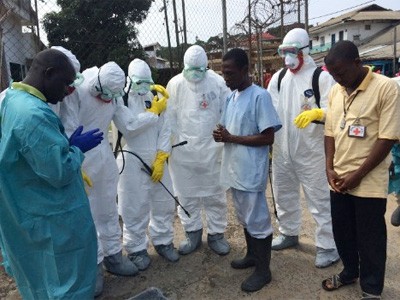As the United States wrestles with its handful of Ebola cases, the impact on the economies of African nations has been far more devastating.
The Ebola epidemic in West Africa has already claimed nearly 3,000 lives since January. In addition to lost lives, the disease has also dealt a severe blow to the families and governments. Abandoned farms are driving up food prices and are leaving the rural communities hungry. Emergency spending on health services is stressing cash – strapped government budgets.
A World Bank Group analysis of the Ebola epidemic found out that if the virus continues to surge in the three worst affected countries of Guinea, Sierra Leone and Liberia then, its economic impacts could be eight folds.
World Bank Group President Jim Yong Kim said, “The primary cost of this tragic outbreak is in human lives and sufferings, which has already been terribly difficult to bear. But our findings make clear that the sooner we get a containment response and decrease the level of fear and uncertainty, the faster we can blunt Ebola’s economic impact.”
Here is a look at the impact on various economies.
- Guinea. Early estimates for growth in Guinea have been halved from 4.5 percent to 2.5 percent as a result of the disease. Already among the poorest countries in West Africa, Guinea has seen the biggest losses in its agriculture industry. An exodus of farmers from the countryside has meant lower exports of key products like cocoa and palm oil.
- Sierra Leone. Sierra Leone, which was once found to move towards a Middle Income status at an 11.3 percent annual growth rate, could see a growth rate of only 8 percent in 2014 and zero is predicted for 2015. The disease has spread to all except one of its 13 districts. The country has been devastated by restrictions in international travels, the closing of markets, disruption of farming activities and a slow-down of its critical mining operations as a result of the foreign workers fleeing the country for fear of contracting Ebola.
- Liberia. The disease so far has worst affected Liberia. The virus has spread quickly and the number of death cases continues to surge. According to the World Bank report, “The largest economic effects of the crisis are not the direct costs, rather those resulting from changes in behavior driven by fear – which have resulted in generally lower demands for goods and services and consequently lower domestic income and employment.” The country could see negative growth rates in 2015 impacted by the closure of one of the country’s two major mining companies as a result of the disease outbreak and by disruptions to farming and agriculture.
The analysis estimates shortterm impact on output to be 2.1 percent points of GDP in Guinea, 3.4 percent points in Liberia and 3.3 percent points in Sierra Leone. This foregone output corresponds to $359 million in 2014 prices. However, if Ebola is not contained, their estimates may rise to $809 million in the three countries alone.
Inflation and food prices were initially contained but are now rising in response to shortages, panic buying and speculation. Those families already vulnerable to food prices shocks are becoming increasingly exposed.
The analysis found out that the largest economic effects of the crisis are not as a result of the direct costs, rather those resulting from aversion driven by fear of contagion. This in turn leads to the fear of association with others and reduces labor force participation, closes places of employment, disrupts transportation and motivates some government and private decision makers to close sea ports and airports.
In the recent history of infectious disease outbreaks like the SARS of 2002-2004 and the H1N1 flu epidemic of 2009, the analysis notes that behavioral effects have been responsible for as much as 80-90 percent of the total economic impact of the epidemics.
Travels to the region have already plummeted. John Grant, executive vice president of aviation info provider Official Airline Guide (OAG), recently calculated that the number of scheduled flights have dropped by 64 percent since May. Major carriers including British Airways and Delta Air Lines are feeling the loss. The president of Dubai – based Emirates too has noted that the Ebola outbreaks has ‘dampened demands’ for Africa bound flights in Asia.
What makes the losses even more unfortunate is that Africa has been in the middle of a major economic revival. For a good part of the past century, poor governance, bad policy and recurring conflict kept Africa on the periphery, when much of the developing world, especially Asia was undergoing development. However, Africa had finally joined the growth party. The International Monetary Fund had expected its GDP to jump by 5.11 percent in 2014 – faster than any region in the developing world other than Asia.
For now, the IMF sees the impact of Ebola on Africa to be somewhat limited. But if the disease spreads, it could derail what could have become one of the most encouraging stories in the emerging world.
RESOURCES
Centers For Disease Control update on Ebola
World Health Organization fact sheet on Ebola
***
Sonali Sen is a graduate student at the Walter Cronkite School of Journalism and Mass Communication. She also works as a graduate assistant for the Reynolds National Center for Business Journalism.









